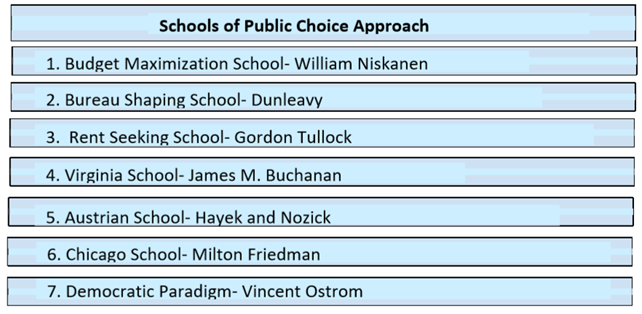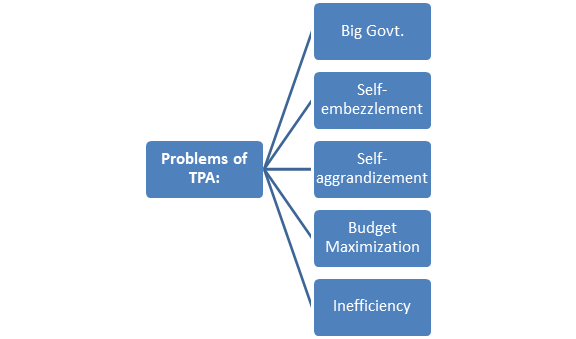Answer:
APPROACH AND STRUCTURE
1. Write an introduction.
2. Write some basics about PCA on political-economy line.
3. Then write about problems of PA.
4. Then write how PCA solves these problems.
5. Discuss: how still PCA has flaws and TPA is relevant.
6. Conclude.
INTRODUCTION: Public Choice Approach emerged during 1960s to promote choice maximisation of people and thus increase efficiency in administration.It was influenced by New Rights Philosophy or Neo Liberal Philosophy whose impact eventually led to rolling back of the state.
BODY.Dennis Mueller defines PCA as the economic study of non-market decision making or simply the application of economics to political science. The public choice approach is the application of economic models of human action to politics and bureaucracy aiming at choice maximization of individuals.
Since the 1960s led by thinkers like Buchanan, Tullock, William Niskanen, Vincent Ostrom et al, the PCA provided an alternative perspective to analysing the functions of government and administration. PCA is considered as an application of consumer behavior theory in the field of public administration and political science. It explains how choice maximization of people can happen by introducing market principles like privatisation, competition, contracting out, performance measurement, institutional pluralism, decentralisation etc.
PCA was influenced by political economy known as neoliberals. Some thinkers include Hayek, Friedman etc. They belonged to classical school led by Adam Smith.

They wanted to bring politics and economy together like it is based on consumer behaviour theory based on Methodological Individualism. Individual is Rational Utility Maximiser and maximises her gain in a given situation and if an individual is given freedom, s/he will maximize gain. That’s why freedom should be given to individual, welfare state should be rejected and PCA should be adopted. People should be given freedom instead of control, there should be market like approach, state should function like market hence it should roll back itself and give roles to the market. Thereby citizens will maximize choices in the context of market. Similarly, in the context of citizen and state relationship people should be given more freedom. There should be maximisation of choices for which state should have limited role and market should have bigger role. This was economic idea of PCA thinkers added to the political ideology.

PCA by applying political-economic theory in the field of PA wants to address the problems of PA and can be characterised as follows:
-
- Institutional Pluralism
- Methodological individualism
- Competition
- Marketisation
- Liberalisation, Privatisation, Globalisation
- 4Ds-denationalisation, decentralization, debureaucratisation and degovernmentalisation.
Impact of PCA School:
PCA influenced the Thatcherism, Reaganism, LPG, NPM which have profound impact on PA as these provided a very attractive idea of how to maximize choice by improving efficiency of the state.
PCA thinkers applied this and analysed the behavior of citizens, politicians and bureaucrats and talked about self-interest. On this basis, they gave the concept of methodological individualism. And therefore, all these thinkers criticised the politicians, bureaucrats, and the welfare state. The central thrust of their argument was that the individuals are self-interested and utility maximize in all settings whether in market place or in politics or bureaucracy. Thus they criticized and rejected the traditional notion of public interest which are the foundational pillars of the state and the administration.
For instance, the budget maximization school led by Niskanen held that the politicians are vote maximizers and the bureaucrats are budget maximizers as per his study in USA. While Dunleavy through his Bureau Shaping model has pointed out the self-interest of the bureaucrats in cornering post retirement jobs.
Vincent Ostrom in his work ‘The Intellectual Crisis in American Public Administration ‘in 1971 criticised almost everything of Traditional PA from political-administration dichotomy to Weberian bureaucracy. He attacked the hegemony of bureaucratic administration and considered bureaucratic administration is the source of crisis in democratic society.
Criticism of PCA:
1. Deficiency in conceptualization of human decision making: Galbraith maintains that real world capitalism is shaped by big corporations and big producers not by the interplay of producers and consumers.
2. Lack of empirical test and mixed evidence: Lewin holds that the budget maximization hypothesis is not sustained by empirical research. For instance, many a times harsh reforms and laws are brought and the government suffered politically as in the case of Farm Bills in India
3. PCA scores low on moral attractiveness: PCA conceptualizes public policy as an outcome of rent seeking behavior of self interest groups. This is a sweeping generalization that defies common sense.
4. The rejection of public interest and welfare is extreme as there is continuous acceptance of communitarianism and welfare in society even today.
Still, it has relevance as some presumptions; characteristics are significant for state if it wants to improve efficiency through
-
- Institutional Pluralism
- LPG
- Competition
- Limited government
- Minimum Government, Maximum Governance
- Greater role to the market
- Choice maximisation to the people
CONCLUSION:
PCA can be applied as means to achieve ends which are democratic values. To solve the problems faced by big government need tools and techniques of PCA. But it would be inappropriate to replace the values of a state with values of market economy.
Spread the Word



